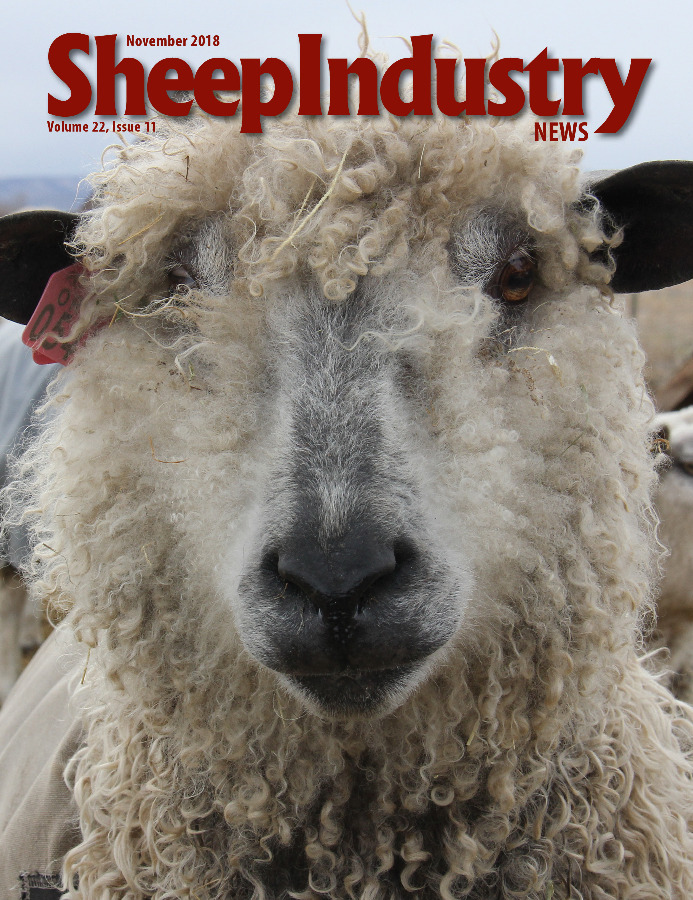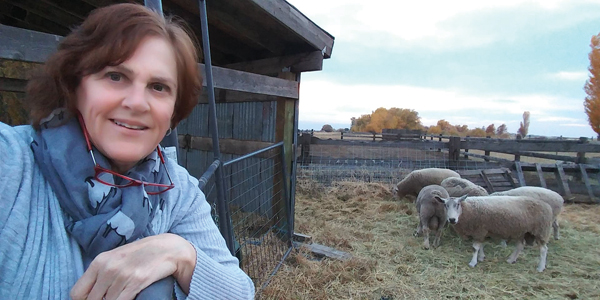
- November 2018
- President’s Notes
- Leading the Way
- ASI Announces Elections
- Lamb Chislic is Official Nosh of S.D.
- Guard Dog Program Supports Legal Defenses
- Raw Material Chronicles Woman’s Wool Industry Journey
- Around the States
- Nominations Open for ASI Awards
- VS Announces Reorganization Plans
- Market Report
- The Last Word
The Last Word

Cooke Creek Sheep Thrives On Relationships with Local Customers
KYLE PARTAIN
Sheep Industry News Editor
There’s no room at the inn, at least if you ask Jami Beintema’s husband, Larry. Based on available feed from their own pastures and Larry’s need to keep horses, Jami’s flock is limited to 50. There will be more when lambing rolls around in the spring, of course, but her lambs don’t usually stick around for long.
Like many of Washington state’s sheep producers, Jami runs a small farm flock. She focuses on long wool breeds such as Coopworths and Border Leicesters. A handful of Texels are also at home on the couple’s small place outside Ellensburg, Wash. It’s an eclectic mix that fits Jami’s personality, and allows her to market wool to an equally eclectic mix of customers.
 “I had a lady come because she wanted to buy my Texel wool to make a mattress for her daughter, like her mother did for her in the old country,” Jami says. “She wanted to pick the fleeces out on the sheep to make sure she got what she wanted. She was from the Middle East, where handmade mattresses are common. It was an interesting experience. She wanted something that wouldn’t wet felt, so she can wash it and manipulate it. Usually I just send the Texel wool to the local wool pool because it’s not something I get a lot of requests for. But Superior Farms loves my Texel-cross lambs. They’re a little smaller, but really meaty.”
“I had a lady come because she wanted to buy my Texel wool to make a mattress for her daughter, like her mother did for her in the old country,” Jami says. “She wanted to pick the fleeces out on the sheep to make sure she got what she wanted. She was from the Middle East, where handmade mattresses are common. It was an interesting experience. She wanted something that wouldn’t wet felt, so she can wash it and manipulate it. Usually I just send the Texel wool to the local wool pool because it’s not something I get a lot of requests for. But Superior Farms loves my Texel-cross lambs. They’re a little smaller, but really meaty.”
Jami, who works in technology support with the local university, admits that finding the right market for her product is a constant challenge. And yet, it’s also one of the more rewarding aspects of her side job as a sheep producer.
“I try to keep everything as local as possible,” she says. “I like getting to meet the people who use my product. I like getting to see what they’re doing with it. It’s a lot more fun than just sending it to the wool pool. Then you have no idea where it ends up. I’ve developed a base of customers who are very adept at working with wool. I have a website and a Facebook page so people can get a feel for what I have. But I also meet a lot of people at fiber festivals and fairs. I also like buying into the local model and supporting small, local business owners.
“I guess it would be pretty cool if I was selling on the world market or something like that, but I just don’t have the fine wools that tend to do well in that market. And I don’t have the kind of quantities that you need to get into that area. That’s why the local aspect of my business works so well for me.”
A handful of local fiber mills (and some not so local) have handled processing of Jami’s fleeces in recent years. Jami does a lot of her own dying to produce a product that appeals to the hand spinners that make up much of her customer base. Long wool sheep are also a good fit for Jami and Larry.
“We need calm, sensible sheep because it’s so windy and cold here at lambing time,” she said. “We need sheep that will follow us with their babies, otherwise those lambs will end up as popsicles because of the wind we get here in the spring.”
Having grown up showing sheep in 4-H, Jami was happy to introduce her daughter to 4-H and that eventually led to jumping in with both feet when they bought a small flock and a ram. As is the case with many farm flocks, it just snowballed from there.
“I’m always wheeling and dealing,” Jami admits. “We’ve driven all over the country to buy sheep because I want to try and stay out in front of genetic improvements. But the best part is building relationships with customers. It makes me feel good to know that they like what I have to sell.”
To learn more, visit CookeCreekSheep.com.

